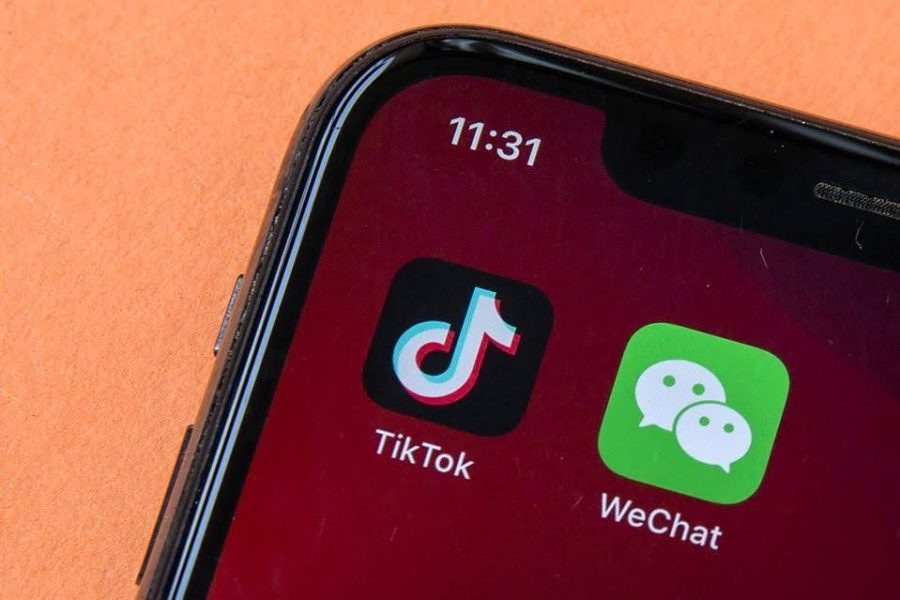TikTok deal given Trump’s blessing; WeChat defended by federal judge
President Trump’s attempts to ban TikTok and WeChat in the U.S. have stirred up both controversy and confusion.
September 26, 2020
After months of deliberations to ban TikTok from the U. S. because of national security concerns, President Trump seems to have reached a resolution for the popular social media app. Earlier this week, the president announced that he had approved a deal between Oracle and ByteDance, allowing the two companies to potentially complete the transaction for the app.
This news comes after the U. S. Department of Commerce issued prohibitions on both TikTok and WeChat, another popular Chinese-owned social media app, on September 18th. Previously, the Department of Commerce issued an order intending to ban both mobile applications from app stores and to bar transactions relating to the apps, stating prohibitions would, “protect users in the U. S. by eliminating access to these applications and significantly reducing their functionality.”
According to the U. S. Department of Commerce’s order, WeChat— an app primarily used by Chinese Americans to connect with family, friends, customers, and business contacts in China— was set to be banned from app stores on September 20, 2020. TikTok— which features a range of short videos including music and short dances— was set to be banned on a later date: November 12, 2020. Any transactions relating to the apps, including any deals made by American companies to buy the apps from their Chinese parent companies, would also be banned on September 20, 2020.
In early August, President Trump issued two executive orders, placing prohibitions on both TikTok and WeChat that would have gone into effect within 45 days. The basis of the executive orders was Trump’s concern over the potential national security risk the apps possibly pose to the United States. Because WeChat “automatically captures vast swaths of information from its users,” the president claimed that, “this data collection threatens to allow the Chinese Communist Party access to Americans’ personal and proprietary information.” As both apps are owned by Chinese companies, Trump made a similar argument for TikTok.
However, when addressing reporters on Saturday, the day before the first bans would go into effect, President Trump declared that he approved of an up and coming deal between a “combination” of Oracle and Walmart, two American companies, and ByteDance, the Chinese parent company of TikTok. While expressing his approval for the deal, the president said, “I think that it’s going to be a fantastic deal… [and] I can say I have given the deal my blessing.” He also stated that the deal would be, “a great deal for America.”
A statement from Oracle verified the existence of the deal that would allow TikTok to remain in use in the United States. According to Oracle CEO Safra Catz, “TikTok will run on the Oracle Cloud.” Catz also addressed the pressing security concern, indicating that the company is, “a hundred percent confident” in their “ability to deliver a highly secure environment to TikTok and ensure data privacy to TikTok’s American users, and users throughout the world.” The company also confirmed its partnership with Walmart in making the deal.
This development prompted the Secretary of Commerce Wilbur Ross to delay the prohibitions made on the transactions relating to TikTok until September 27, 2020. The app store ban slated for November 12th remains in effect.
On September 20th, the day WeChat was slated to be banned from app stores, members of the U. S. WeChat Users Alliance filed a lawsuit against the U. S. government in San Francisco. Consequently, United States Magistrate Judge Laurel Beeler of California ruled the ban on WeChat unconstitutional, indicating that the ban interferes with users’ First Amendment rights. As of September 24th, both WeChat and TikTok remain available in app stores.
According to NextShark, a website for primarily Asian news and opinions, WeChat users feared that a ban on the app would “effectively prohibit” them from using it. With the most users in the U. S. being Chinese Americans, many rely on the app for work or communicating with family and friends back in China. For some, it is the only way to communicate with family in China.
Many American teenagers, who are avid users of the popular app, also had a negative opinion towards the attempt to ban TikTok, seeing no security risk in the video-sharing app which featured mostly dance and lip-sync videos. Others believed there to be greater issues for the president to focus on.
Junior Miranda McGeoghegan said, “it’s insane that [President Trump is] focusing more on TikTok than…on his actual job… it’s sad to see our president focus on some unproven ‘Chinese data mining’ than issues that really matter,” like the coronavirus pandemic and the fires in the Pacific Northwest.
Junior Ashley Jewell also agreed that the president, “is focusing on the wrong issues,” arguing that, “our country should be more focused on how divided it’s become, where we can’t even solve anything without it becoming a critical debate.”


































